
A film festival is an organized, extended presentation of films in one or more cinemas or screening venues, usually in a single city or region. Increasingly, film festivals show some films outdoors. Films may be of recent date and, depending upon the festival's focus, can include international and domestic releases. Some film festivals focus on a specific filmmaker, genre of film, or subject matter. Several film festivals focus solely on presenting short films of a defined maximum length. Film festivals are typically annual events. Some film historians, including Jerry Beck, do not consider film festivals as official releases of the film.

The Venice Film Festival or Venice International Film Festival is an annual film festival held in Venice, Italy. It is the world's oldest film festival and one of the "Big Five" International film festivals worldwide, which include the Big Three European Film Festivals, alongside the Toronto Film Festival in Canada and the Sundance Film Festival in the United States. The Festivals are internationally acclaimed for giving creators the artistic freedom to express themselves through film. In 1951, FIAPF formally accredited the festival.

Kim Ki-duk was a South Korean film director and screenwriter, noted for his idiosyncratic art-house cinematic works. His films have received many distinctions in the festival circuit, rendering him one of the most important contemporary Asian film directors.

John Marley was an American actor and theatre director. He won the Volpi Cup for Best Actor at the 29th Venice International Film Festival for his performance in John Cassavetes' Faces (1968), and was nominated for an Academy Award and a Golden Globe Award for his role in Love Story (1970). He was also known to film audiences for his role as Jack Woltz—the defiant film mogul who awakens to find the severed head of his prized thoroughbred horse in his bed—in The Godfather (1972).
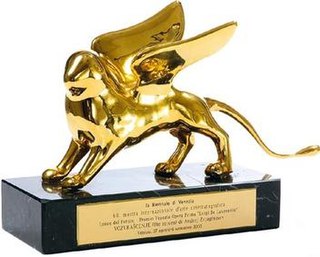
The Golden Lion is the highest prize given to a film at the Venice Film Festival. The prize was introduced in 1949 by the organizing committee and is now regarded as one of the film industry's most prestigious and distinguished prizes. In 1970, a second Golden Lion was introduced; this is an honorary award for people who have made an important contribution to cinema.

The cinema of Russia began in the Russian Empire, widely developed in the Soviet Union and in the years following its dissolution. The Russian film industry would remain internationally recognized. In the 21st century, Russian cinema has become known internationally with films such as Hardcore Henry (2015), Leviathan (2014), Night Watch (2004) and Brother (1997). The Moscow International Film Festival began in Moscow in 1935. The Nika Award is the main annual national film award in Russia.

The Carnival of Venice is an annual festival held in Venice, Italy, famous throughout the world for its elaborate costumes and masks. The carnival ends on Shrove Tuesday, which is the day before the start of Lent on Ash Wednesday.

Vampire in Venice, also known as Prince of the Night and Nosferatu in Venice is a 1988 Italian supernatural horror film directed by Augusto Caminito and an uncredited Klaus Kinski, and starring Kinski, Christopher Plummer, Donald Pleasence, and Barbara De Rossi. The story follows Professor Paris Catalano (Plummer), who travels to Venice following the trail of the last known appearance of Nosferatu (Kinski), who was seen at Carnival in 1786. Catalano learns through a séance that the vampire is seeking eternal death, and tries to put an end to its existence once and for all.

The Volpi Cup for Best Actress is an award presented by the Venice Film Festival. It is given by the festival jury in honor of an actress who has delivered an outstanding performance from the films in the competition slate. It is named in honor of Count Giuseppe Volpi di Misurata, the founder of the festival. The 1st ceremony was held in 1932, when Helen Hayes received the Volpi Cup for the title role in The Sin of Madelon Claudet (1931)—this was the only time that the award was chosen by public voting. From 1942 to 1945, the festival was suspended because of World War II. The student protests in May 1968 opened a period of institutional changes, with no prizes were awarded from 1969 to 1979.

The Queer Lion is the trophy awarded yearly since 2007 to the “Best Movie with LGBT Themes & Queer Culture” among those presented during the Venice International Film Festival.
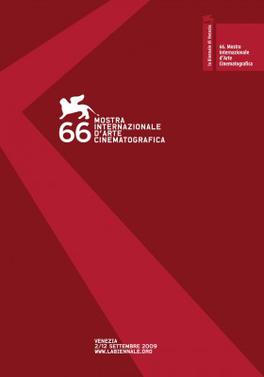
The 66th annual Venice International Film Festival, held in Venice, Italy, was held from 2 to 12 September 2009, with Maria Grazia Cucinotta serving as the festival's hostess. The opening film of the festival was Baarìa by Giuseppe Tornatore and the closing film was Chengdu, I Love You by Fruit Chan and Cui Jian.
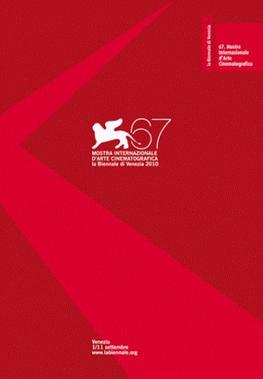
The 67th annual Venice International Film Festival held in Venice, Italy, took place from 1 to 11 September 2010. American film director and screenwriter Quentin Tarantino was the head of the Jury. The opening film of the festival was Darren Aronofsky's Black Swan, and the closing film was Julie Taymor's The Tempest. John Woo was awarded the Golden Lion for Lifetime Achievement prior to the start of the Festival.

The 68th annual Venice International Film Festival was held in Venice, Italy between 31 August and 10 September 2011. American film director Darren Aronofsky was announced as the Head of the Jury. American actor and film director Al Pacino was presented with the Glory to the Film-maker award on 4 September, prior to the premiere of his upcoming film Wilde Salomé. Marco Bellocchio was awarded with the Golden Lion for Lifetime Achievement in September. The festival opened with the American film The Ides of March, directed by George Clooney, and closed with Damsels in Distress by Whit Stillman.

The 69th annual Venice International Film Festival, organized by Venice Biennale, took place at Venice Lido from 29 August to 8 September 2012. The festival opened with the Indian director Mira Nair's The Reluctant Fundamentalist, and closed with the Out of Competition film The Man Who Laughs, directed by Jean-Pierre Ameris. Terrence Malick's film To the Wonder was met with both boos and cheers from critics at its premiere.

Traditions of Italy are sets of traditions, beliefs, values, and customs that belongs within the culture of Italian people. These traditions have influenced life in Italy for centuries, and are still practiced in modern times. Italian traditions are directly connected to Italy's ancestors, which says even more about Italian history.

The 70th annual Venice International Film Festival took place in Venice, Italy from 28 August to 7 September 2013. American film director William Friedkin was presented with a lifetime achievement award. Italian film director Bernardo Bertolucci was the President of the Jury. He was previously the President of the Jury at the 40th edition in 1983. Gravity, directed by Alfonso Cuarón, was the opening film of the festival. Italian actress Eva Riccobono hosted the opening and closing nights of the festival.
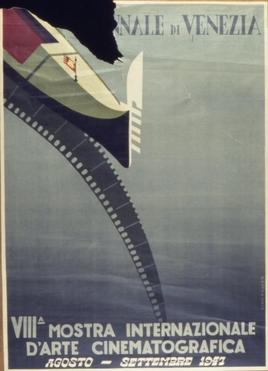
The 8th Venice International Film Festival was held from 23 August to 15 September 1947. Screenwriter Vinicio Marinucci was appointed as the President of the Jury. Formally, it still was not the Golden Lion to designate the highest honor of the event. The prize was known as the Grand International Prize of Venice, which was awarded to The Strike, directed by Karel Steklý.
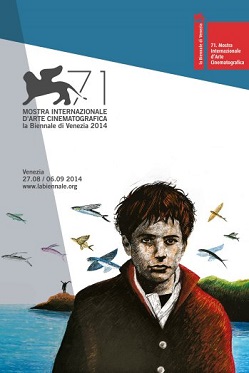
The 71st annual Venice International Film Festival took place in Venice, Italy between 27 August to 6 September 2014. The festival opened with Alejandro G. Iñárritu's film Birdman, and closed with Ann Hui's drama film The Golden Era. Italian actress Luisa Ranieri hosted the opening and closing nights of the festival. The Swedish film A Pigeon Sat on a Branch Reflecting on Existence, directed by Roy Andersson, won the Golden Lion, and Joshua Oppenheimer's The Look of Silence won the Grand Jury Prize.
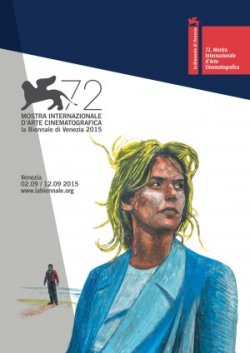
The 72nd annual Venice International Film Festival took place from 2 to 12 September 2015. Alfonso Cuarón served as the President of the Jury for the main competition. A restored version of Federico Fellini's film Amarcord was shown at the festival. The Venezuelan film From Afar by Lorenzo Vigas won the Golden Lion award.
The Special Jury Prize is an official award given at the Venice Film Festival to one of the feature films in competition slate since 2013. It is considered the third most prestigious prize at the festival, the runner-up to both the main award Golden Lion and the second place award Grand Jury Prize.


















